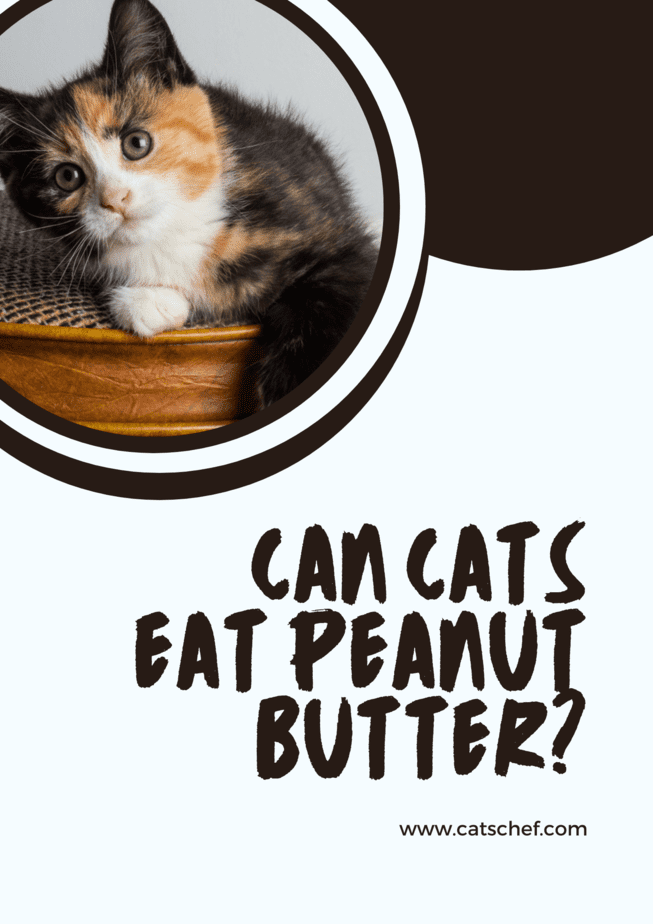Oh, the struggle of sitting on the bed, minding your own business, when your furry friend starts throwing glances at you. Whether you’re munching on Reeses Peanut Butter Cups, scoffing down an entire packet of Nutter Butters, or eating peanut butter straight out of the jar, she’s begging for a taste. But, can cats eat peanut butter?
She’s giving you the look, waiting for the right opportunity to jump on your lap and snatch that bite right out of your mouth. More times than not, you’re too weak to ignore her scrunched-up snout and perked-up ears. So, you accidentally drop a little on the floor and spend the rest of the day feeling guilty.
And don’t even get me started on the look she gave you when she found out Ben and Jerry’s was making Doggie Desserts? Or the miserable meow she let out when she saw your neighbor’s dog licking peanut butter straight out of the jar for a TikTok video? And he went viral?!
Hold your horses (or better, hold your cats!?), you might be able to provide your precious purrincess with a nutty treat sooner or later. According to our friends over at the ASPCA (American Society for the Prevention of Cruelty to Animals), cats can eat peanut butter! Technically speaking.
Cats can eat peanuts, but peanut butter can contain ingredients that can cause harm to your cat’s health when consumed over a longer period. And don’t even get me started on peanut butter treats (or chocolate peanut butter?).
Here’s everything you need to know about cats, peanut butter, and their complicated relationship before you draw a conclusion. Let’s start from the beginning, why don’t we!
What’s peanut butter?
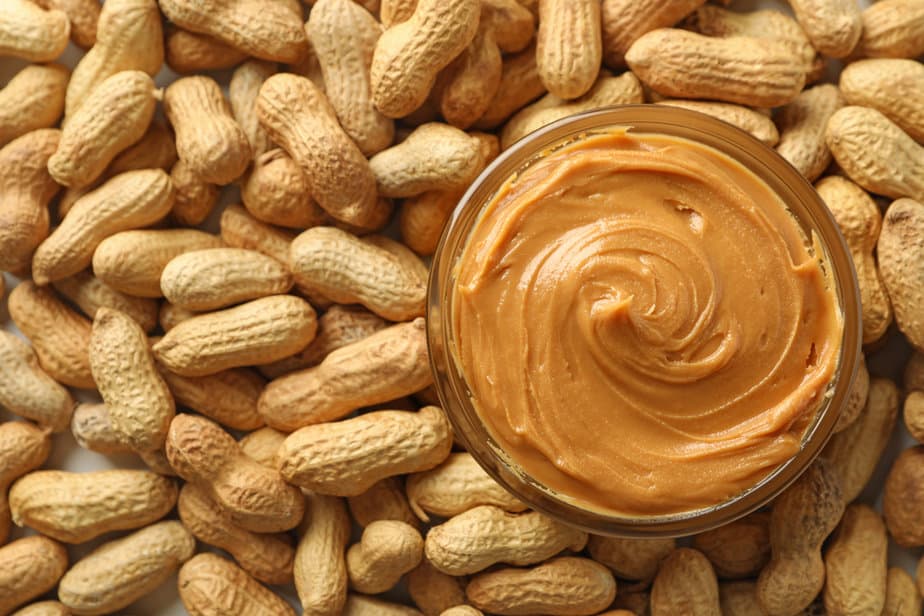
We’re pretty sure everyone and their mother knows about peanut butter, but… When we’re talking about what’s good for our four-legged friends, every detail matters. We don’t want them to suffer because we couldn’t be bothered to dig deeper.
So, peanut butter happens to be a simple paste made from roasted peanuts. Homemade peanut butter typically doesn’t come with anything other than peanuts (maybe a pinch of salt for good measure). But, the one you get from the store does.
Store-bought peanut butter typically contains a bunch of other ingredients. Sugar and honey (for a sweet kick), salt (again, for good measure), oil and fat (depending on the type), and other additives, preservatives, and artificial colorings.
Peanut butter can be both creamy and crunchy, sweet and salty. And, most importantly, peanut butter can contain a bunch of protein, fiber, vitamins, minerals, and healthy fats.
Homemade peanut butter (or the organic peanut butter you can get from Whole Foods or Trader Joe’s) doesn’t contain anything other than peanuts, so there’s no surprise there. Peanuts are beaming with vitamin E, biotin, copper, niacin, folate, manganese, thiamine, and numerous other nutrients.
But, can cats benefit from these nutrients? Can cats eat peanut butter? Head on to the succeeding section of this article to learn about the dark side of feeding peanut butter to your cat.
So, can cats eat peanut butter?
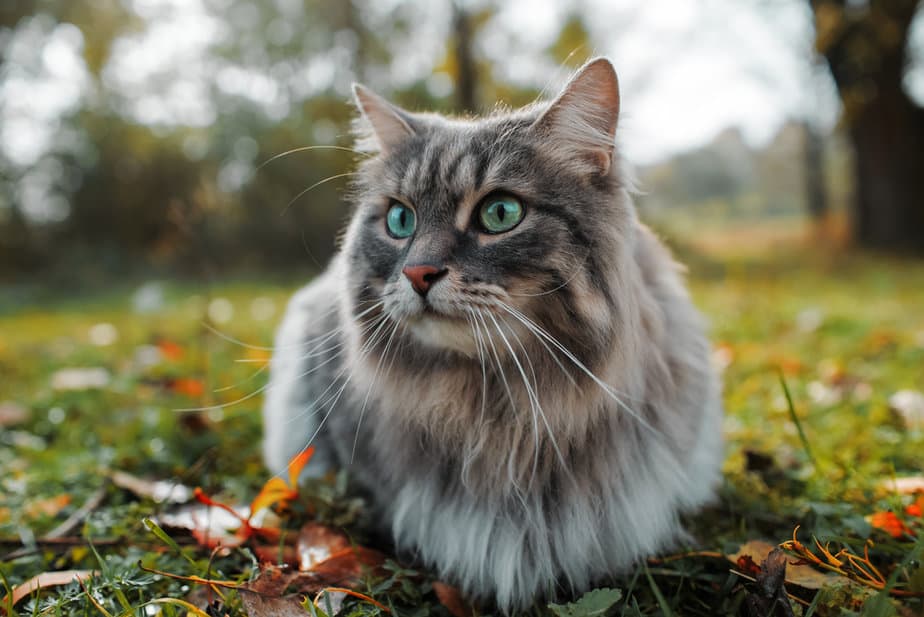
Not every question you have about your cat’s eating habits can get a straight “yes” or “no” answer. Technically speaking, cats can eat peanut butter because peanut butter doesn’t contain anything that can harm your cat. Cats can eat peanuts which makes the “yes” part of the answer even more solid.
But, that doesn’t mean that you should grab your four-legged friend and head out to the nearest farmer’s maker to get yourselves a bucket of peanut butter. Cats can eat peanut butter. But, that doesn’t mean that peanut butter should be a regular part of your cat’s diet.
You see, cats are carnivores which means they require a bunch of meat, animal protein, and animal-sourced nutrients in their diets. They don’t require fruits, veggies, and nuts the same way humans do.
Not only that, but their digestive systems don’t even possess the enzymes necessary to break down most foods humans eat on a regular. They’re pretty much set out to spend the rest of their lives on a Keto diet. And they’re pretty stoked about that, too!
So, peanut butter doesn’t really provide any nutritional value for your furry friend. Sure, she can have a lick or two when she’s in the mood for a little pick-me-up. But, there’s pretty much no reason to include this sweet and savory treat into her regular diet.
Actually, the type of peanut butter most humans use contains a bunch of things that can leave your cat running to her litterbox (to say the least!).
Reasons why you shouldn’t feed peanut butter to your cat
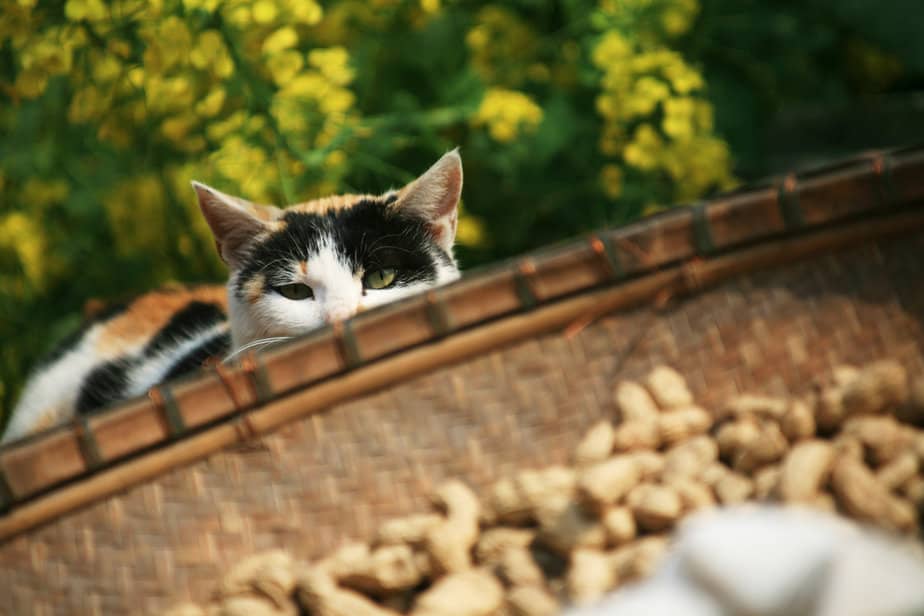
Here’s the thing, a lick or two of peanut butter shouldn’t cause any harm to your four-legged friend. There’s no reason to panic and contact your vet whenever she gets into your secret Reese’s peanut butter stash. Or even more so, whenever she snatches your spoon while you’re too busy watching Friends.
Peanuts shouldn’t cause any harm to your cat. Homemade (or even organic) peanut butter shouldn’t send your cat into a neverending cycle of digestive problems. But, the type of peanut butter you normally get from your local farmer’s market can contain some stuff you might now want to see in your cat’s regular diet.
1. Fat
Who’s surprised to see fat as one of peanut butter’s worse ingredients!? Even the homemade, organic type of peanut butter contains a bunch of fats. Healthy fats, but fats nonetheless.
What does fat do to your cat’s health? A bit of fat here and there shouldn’t cause any problems to your furry friend. Actually, a bit of fat can maintain the health and shine of your cat’s skin and hair (Priyanka Chopra who?!). But, too much fat can cause a bunch of digestive and gastrointestinal problems.
And we’re not talking only about (less severe) symptoms such as weakness, lethargy, diarrhea, and vomiting. Consuming too much fat over a longer period can cause weight gain, obesity, and diabetes. And don’t even get me started on heart problems and heart disease!
Peanut butter (regardless of the type) might not be the best decision for your furry friend. Consult with your vet and check whether your cat’s digestive system possesses the strength to deal with such high levels of fat.
2. Sodium
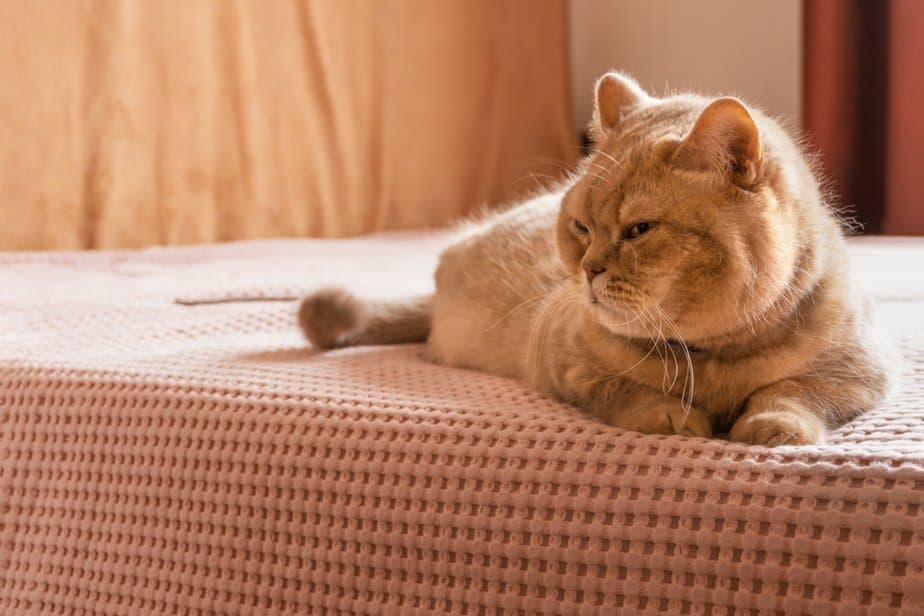
You’re wondering whether cats can eat peanut butter? Take a look at the sodium levels and draw your own conclusion. Peanut butter that’s made from natural peanuts might not contain that much sodium. But, most types of peanut butter aren’t made from natural peanuts.
They’re made from roasted peanuts which contain a bunch of sodium, fat, and other additives that act as flavor enhancers. So, what’s the deal with cats and sodium?
Sodium (or salt) shouldn’t be detrimental to your furry friend’s health when consumed in moderate amounts. Sodium becomes detrimental to your furry friend’s health when consumed in excessive amounts (thirsty, dehydrated, weak).
And, sodium becomes fatal when consumed in excessive amounts over a long period (sodium poisoning). Some of the most common symptoms of sodium poisoning are vomiting, diarrhea, loss of appetite, weakness, lethargy, and excessive thirst or urination.
But, don’t worry. Your furry friend would have to scoff down an entire thing of Reese’s peanut butter to experience any of these symptoms. Give her a lick or two whenever she’s curious (meowing, purring, pushing you with her paws). Other than that, keep the peanut butter consumption to a minimum.
3. Xylitol
Last but not least, we have artificial sweeteners! Xylitol’s one of the biggest reasons why you’re better off feeding your four-legged friend homemade treats ( and yes, xylitol does sound like the name of Elon Musk’s next child).
Throw a glance at the ingredient list and check whether your peanut butter has the “added ingredients” section. So, the crème de la crème (according to your furry friend’s needs) of peanut butter doesn’t contain anything other than peanuts.
But, the type of peanut butter you get from your local farmer’s market typically contains artificial sweeteners such as xylitol. Here’s the thing, xylitol can be pretty detrimental to your furry friend’s health.
Diarrhea, vomiting, drooling, weakness, lethargy, tremors, and seizures are only some of the symptoms you might notice. But, you can always grab your four-legged friend and rush to the nearest Whole Foods or Trader Joe’s to get yourselves a thing of organic, plain peanut butter.
Can cats eat Jif peanut butter?
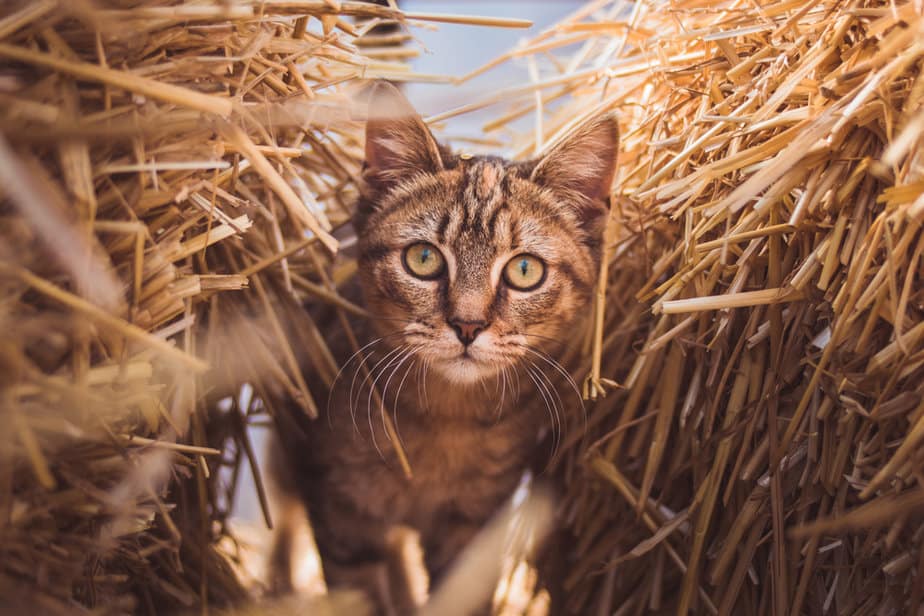
Unfortunately, no. Jif peanut butter happens to be one of those kinds of peanut butter that contain a bunch of other (completely unnecessary) ingredients. We’ve scoured the internet and here’s what we’ve found out.
Jif peanut butter contains roasted peanuts, fully hydrogenated vegetable oils (rapeseed and soybean), mono and diglycerides, molasses, sugar, and salt. None of these ingredients scream “we’re going to make your cat happy and healthy”, now do they?!
Can cats eat Reese’s peanut butter?
Unfortunately, the answer’s no once again. Reese’s peanut butter also contains the same ingredients as Jif peanut butter with additional peanut oil and cornstarch.
Notice how Reese’s peanut butter contains even more fat and oil? You can draw your own conclusions, but we’re pretty sure these ingredients make this brand of peanut butter even worse for your cat’s health than the one we mentioned beforehand.
Can cats eat peanut butter treats?
Last but not least, the answer’s no. However, the answer does depend on the type of peanut butter treats were talking about. Have Ben and Jerry’s made peanut butter Meow Meals (instead of Doggie Desserts, of course)?
Cats can eat peanut butter treats that haven’t been made with ingredients that aren’t meant to be consumed by a cat (that’s our logic). But, cats can’t eat peanut butter treats that have been made for humans.
One of the most popular peanut butter treats made for humans are Reese’s peanut butter cups, right? These peanut butter treats contain peanut butter, chocolate, sugar, salt, oil, and pretty much everything else your furry friend shouldn’t eat. Don’t even get me started on chocolate (killer treat, no pun intended).
Nutter Butters, another popular peanut butter treat, contains flour, sugar, salt, and oil (and peanut butter, of course). These peanut butter treats seem a bit better than Reese’s peanut butter cups but they’re not the best option for your four-legged friend.
We could go on about every single peanut butter treat on the market for days. Trust me, you’re better off feeding your furry friend carefully crafted cat treats than whatever weird peanut butter treat you had on your mind.
Conclusion
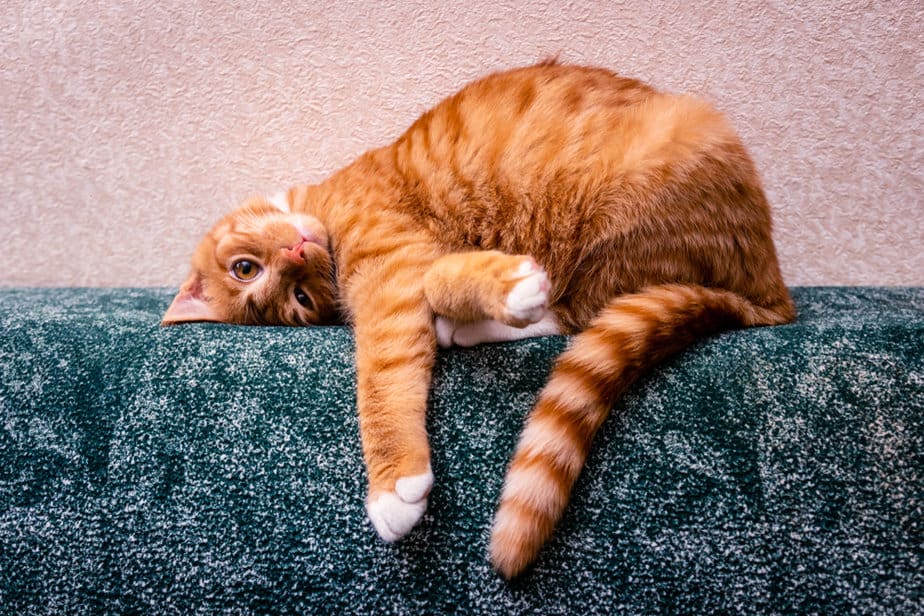
Cats can eat peanut butter, but that doesn’t mean that they should. Peanut butter shouldn’t be a regular part of your cat’s diet, but an occasional lick or two shouldn’t cause her harm.
You’re better off making the peanut butter yourself and sharing some with your four-legged friend. Unfortunately, the type of peanut butter you typically get from the store contains a bunch of oil, salt, and xylitol which can cause harm to your cat’s health.
Consult with your vet before making any significant changes to your cat’s diet.
